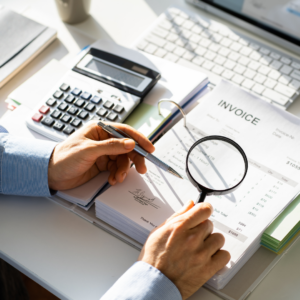Financial fraud is more common than you might think, and unfortunately, it’s something that can happen to anyone. Even worse, many victims often feel embarrassed or ashamed, thinking they should have seen it coming. But the truth is, scammers are professionals at what they do, and falling for a scam is not a reflection of your intelligence or judgment.
The good news? By learning how to spot scams and taking a few simple precautions, you can protect yourself and your finances. Here’s how.
- Start with Education
A little knowledge goes a long way when it comes to preventing financial fraud. The more you know about common scams, the easier it will be to recognize when something feels off. From phishing emails to fake tax notices, scammers use a variety of methods to try to trick you.
Learning about these tactics doesn’t have to be overwhelming. There are great resources online, like the IRS.gov website, which has an entire section on tax-related scams. A quick look through these types of guides can help you know what to watch out for and if something seems suspicious, take a moment to pause and investigate before moving forward.
- Ask for a Second Opinion
Scammers often target people when they’re feeling emotional or stressed. For example, if you receive a surprise bill or an urgent notice that you owe money, it can be easy to panic and make quick decisions. This is exactly what scammers are counting on.
Before you act, take a step back and ask for a second opinion. Whether it’s a trusted friend, family member, or a professional like a CPA, getting a fresh perspective can help you think more clearly. If something feels too good to be true, or if the request seems urgent and unexpected, take extra caution.
- Watch for Red Flags
Scammers often give themselves away through small mistakes. One common trick is to create fake websites or emails that look almost identical to legitimate ones. For example, a scammer might send an email from “Amzaon.com” instead of “Amazon.com”, a tiny change that’s easy to overlook.
Keep an eye out for misspelled words, suspicious links, or emails that just don’t feel right. If you’re unsure, don’t click on any links or provide personal information. Instead, go directly to the company’s official website or contact them to verify.
- Stay on Top of Your Finances
One of the simplest ways to protect yourself from fraud is to regularly monitor your accounts. By checking your bank statements and credit card transactions often, you can catch any unusual activity right away. If someone has stolen your information and made unauthorized purchases, the sooner you notice, the quicker you can act.
This doesn’t have to be complicated, setting up automatic account alerts or reviewing your statements once a week can make a big difference in catching potential fraud early.
- Consider a Credit Freeze
A credit freeze is an easy and effective way to protect yourself from identity theft. When your credit is frozen, no one (including you) can open a new credit account in your name without unfreezing it first. This can stop scammers in their tracks, especially if they’re trying to take out loans or credit cards in your name.
Freezing your credit is free, and you can easily unfreeze it when needed. It’s a simple step that provides an extra layer of protection against fraud.
Final Thoughts: Be Vigilant, Stay Safe
Financial fraud is something we all need to be aware of, but it doesn’t have to be scary or overwhelming. By staying informed, asking for help when needed, and keeping a close eye on your finances, you can significantly reduce your risk of becoming a victim.
And remember, if you ever feel unsure or something doesn’t seem right, trust your instincts, it’s always better to take a moment to double-check than to rush into a decision that could cost you.
Listen to Our Podcast Episode: Hide and Seek with Fraud Here
Learn more about how we have helped our current clients achieve their goals.
